#russian consulate
Explore tagged Tumblr posts
Text
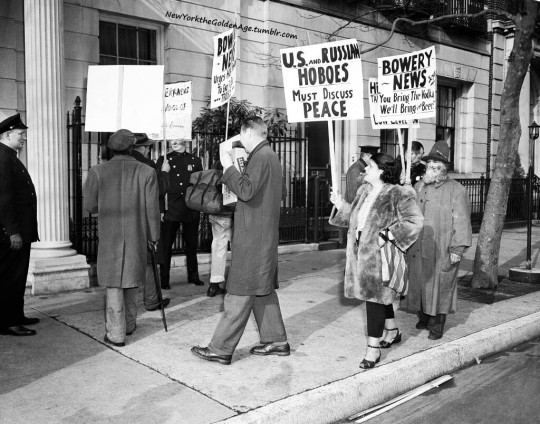
Hobos think about politics, too. Here they’re picketing the Russian consulate at Park Avenue and 68th Street on December 6, 1951. Prominent in the picket line is ‘Boxcar Betty,” beauty editor of the Bowery News, and (behind her) Bozo, noted knight of the road.
Photo: John Rooney for the AP
#vintage New York#1950s#John Rooney#Cold War#peace demonstration#hobos#hobos for peace#Russian consulate#Dec. 6#6 Dec.#1950s New York#Boxcar Betty#political demonstration#Bozo hobo
30 notes
·
View notes
Photo


Russian Consulate
13 notes
·
View notes
Text
Polish consulate in St Petersburg closing after 50 years of continuous operation. Which could mean nothing,
#In fairness everyone is closing their Russian consulates or has been since 2021-22#But still. Aaaaaaaaaaa#I don't like it :(
9 notes
·
View notes
Text
Tried to finish watching Geurnica and uh...
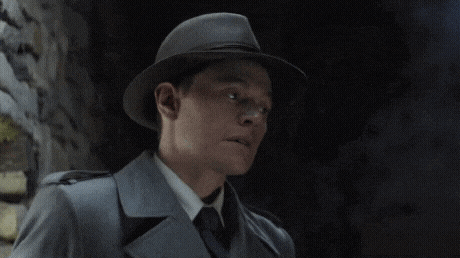
Suffice to say I have failed spectacularly.
#good golly miss molly we're in for a folly#burn gorman#this gif doesn't at all do the shot justice 😐#my gifs#his russian-esque accent is a lot better!#guernica#guernica 2016#the consul#this shot is giving me vague whisps of inspiration for a fic... 🤔#man i need a tag for burn now fuck#the burn collection#pretty. pretty man#why are you that much more handsome when you're playing such bastards?#shut up ace
14 notes
·
View notes
Text
0 notes
Text
Unlocking Russia Visa for Indians | A Comprehensive Guide
When contemplating international travel, one of the paramount considerations for Indian travellers is securing a Russia visa for Indians. The labyrinthine world of visa applications can appear intimidating, but fret not. This guide is designed to demystify the process and furnish you with the indispensable information you require. Whether your intentions involve a leisurely vacation, a business…

View On WordPress
#consulate#indian passport#russia visa#russian embassy#travel documentation#travel to Russia#visa application#visa for indian citizens#visa processing#visa requirement
1 note
·
View note
Video
❗In Rio de Janeiro, an employee of the 💩russian consulate attacked a russian woman who came to protest against the war in Ukraine.
❗У Ріо-де-Жанейро співробітник 💩російського консульства напав на росіянку, яка прийшла висловити протест проти війни в Україні.
#youtube#❗In Rio de Janeiro an employee of the 💩russian consulate attacked a russian woman who came to protest against the war in Ukraine. ❗У Ріо-д
0 notes
Text




This is how the day of 20 December began for residents of the Ukrainian capital. Mine also began with me getting out of bed to the sound of Russian missiles and calming frightened animals.
I don't like to talk about it, but there is still a war going on in Ukraine. It may seem that it is over, but it is not. Kyiv and the Kyiv region are under threat, so don't forget who Russia is, and there are drones flying overhead every night. Some people are used to sleeping under explosions, while others run to bomb shelters or the subway every night to hide from Russian drones.
Today my city came under rocket fire again. Three districts of Kyiv were attacked. In one of the districts there is a beautiful Gothic church of St Nicholas, which was damaged, as well as several historic buildings. In addition, six consulates and embassies were damaged. So do not forget who Russia is and its crimes against Ukraine, Georgia, Syria, etc.
473 notes
·
View notes
Text
America owes its independence to Haym Salomon, a Sephardic Jewish Patriot
youtube
A Jewish American Hero
by Yosef Kaufmann
October 17, 1781. An eerie silence takes hold over the battlefield outside Yorktown, Virginia. After weeks of non-stop artillery shells and rifle fire, the rhythmic pounding of a drum is all that is heard. Through the wispy smoke that floats above the battlefield, a British officer can be seen waving a white flag. General Cornwallis has surrendered Yorktown, ending the last major battle of the American Revolution. The surrender of Yorktown and the nearly 8,000 British troops convinced the British Parliament to start negotiating an end to the war. On September 3, 1783, the treaty of Paris was signed. The war was over.
If not for Haym Salomon, however, the decisive victory at Yorktown never would have happened.
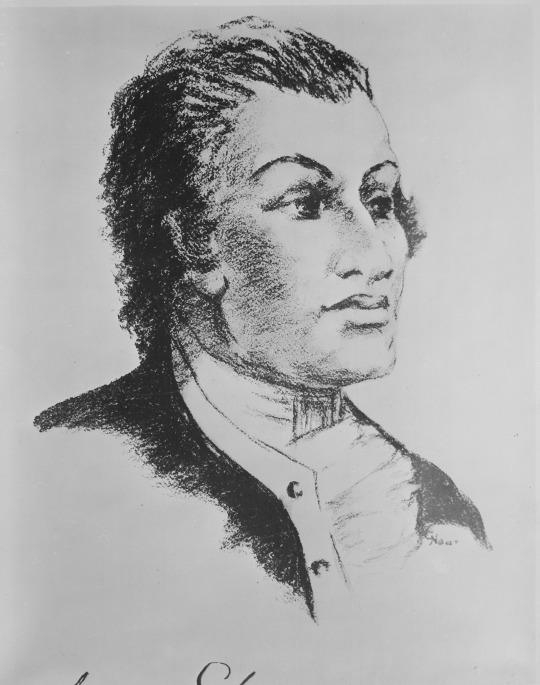
Haym Salomon was born in Leszno, Poland, in 1740. In 1770, he was forced to leave Poland for London as a result of the Partition of Poland. Five years later, he left London for New York City, where he quickly established himself as a broker for international merchants.
Sympathetic to the Patriot cause, Haym joined the New York branch of the Sons of Liberty, a secret society that did what it could to undermine British interests in the colonies. In 1776, he was arrested by the British and charged with being a spy. He was pardoned on condition that he spend 18 months on a British ship serving as a translator for the Hessian mercenaries, as he was fluent in Polish, French, German, Russian, Spanish and Italian. During those 18 months, Haym used his position to help countless American prisoners escape. He also convinced many Hessian soldiers to abandon the British and join the American forces.
In 1778, he was arrested again and sentenced to death for his involvement in a plot to burn the British Royal fleet in the New York Harbour. He was sent to Provost to await execution, but he managed to bribe a guard and escape under the cover of darkness.
He fled New York, which was under the control of the British army, and moved to Philadelphia, the capital of the Revolution.
He borrowed money and started a business as a dealer of bills of exchange. His office was located near a coffee house frequented by the command of the American forces. He also became the agent to the French consul and the paymaster for the French forces in North America. Here he became friendly with Robert Morris, the newly appointed Superintendent of Finance for the 13 colonies. Records show that between 1781 and 1784, through both fundraising and personal loans, he was responsible for financing George Washington over $650,000, today worth approximately over $13 million.
By 1781, the American congress was practically broke. The huge cost of financing the war effort had taken its toll. In September of that year, George Washington decided to march on Yorktown to engage General Cornwallis. A huge French fleet was on its way from the West Indies under the command of Comte De Grasse. The fleet would only be able to stay until late October, so Washington was facing immense pressure to lead an attack on Yorktown before then.
After marching through Pennsylvania, with little in the way of food and supplies, Washington’s troops were on the verge of mutiny. They demanded a full month's pay in coins, not congressional paper money which was virtually worthless, or they would not continue their march. Washington wrote to Robert Morris saying he would need $20,000 to finance the campaign. Morris responded that there was simply no money or even credit left. Washington simply wrote, “Send for Haym Salomon.” Within days, Haym Salomon had raised the $20,000 needed for what proved to be the decisive victory of the Revolution.
Haym’s chessed continued after the war. Whenever he met someone who he felt had sacrificed during the war and needed financial assistance, he didn’t hesitate to do whatever he could to help.
He was also heavily involved in the Jewish community. He was a member of Congregation Mikveh Yisroel in Philadelphia, the fourth oldest synagogue in America, and he was responsible for the majority of the funds used to build the shul’s main building.
He also served as the treasurer to the Society for the Relief of Destitute Strangers, the first Jewish charitable organization in Philadelphia.
On January 8, 1785, Haym died suddenly at the age of 44. Due to the fact the government owed him hundreds of thousands of dollars, his family was left penniless.
His obituary in the Independent Gazetteer read:
Thursday, last, expired, after a lingering illness, Mr. Haym Salomon, an eminent broker of this city, was a native of Poland, and of the Hebrew nation. He was remarkable for his skill and integrity in his profession, and for his generous and humane deportment. His remains were yesterday deposited in the burial ground of the synagogue of this city.
Although there is little proof, many believe that when designing the American Great Seal, George Washington asked Salomon what he wanted as compensation for his generosity during the war. Salomon responded “I want nothing for myself, rather something for my people.” It is for this reason that the 13 stars are arranged in the shape of the Star of David.
#jumblr#haym salomon#where is his musical?#jewish history#4th of july#independence day#american history#american war of independence#american revolution#jewish diaspora in america#Youtube#NOTE: I report and block antisemites. Any antisemites who comment on this post I will report and block you. You have been warned.
161 notes
·
View notes
Text
TIFF: And so it continues...
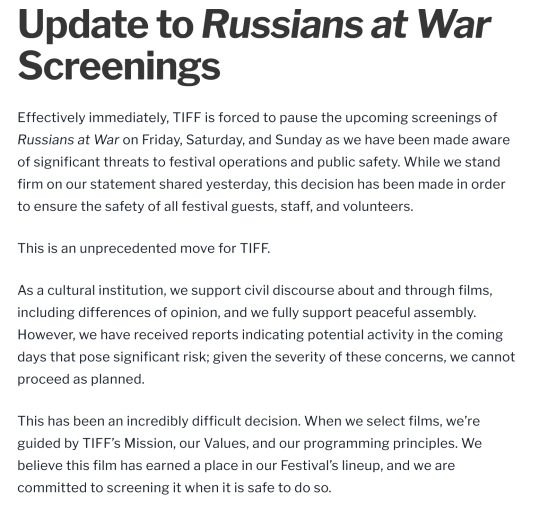
Update to Russians at War Screenings Effectively immediately, TIFF is forced to pause the upcoming screenings of Russians at War on Friday, Saturday, and Sunday as we have been made aware of significant threats to festival operations and public safety. While we stand firm on our statement shared yesterday, this decision has been made in order to ensure the safety of all festival guests, staff, and volunteers. This is an unprecedented move for TIFF. As a cultural institution, we support civil discourse about and through films, including differences of opinion, and we fully support peaceful assembly. However, we have received reports indicating potential activity in the coming days that pose significant risk; given the severity of these concerns, we cannot proceed as planned. This has been an incredibly difficult decision. When we select films, we’re guided by TIFF’s Mission, our Values, and our programming principles. We believe this film has earned a place in our Festival’s lineup, and we are committed to screening it when it is safe to do so. Effectively immediately, TIFF is forced to pause the upcoming screenings of Russians at War on Friday, Saturday, and Sunday as we have been made aware of significant threats to festival operations and public safety. While we stand firm on our statement shared yesterday, this decision has been made in order to ensure the safety of all festival guests, staff, and volunteers. This is an unprecedented move for TIFF. As a cultural institution, we support civil discourse about and through films, including differences of opinion, and we fully support peaceful assembly. However, we have received reports indicating potential activity in the coming days that pose significant risk; given the severity of these concerns, we cannot proceed as planned. This has been an incredibly difficult decision. When we select films, we’re guided by TIFF’s Mission, our Values, and our programming principles. We believe this film has earned a place in our Festival’s lineup, and we are committed to screening it when it is safe to do so.
While it's great this propaganda film was suspended (not cancelled), TIFF still double downed on their original stance.
What's not great is TIFF's insinuation that the supposed threats they received came from protesters and groups from the Ukrainian-Canadian community.
Meanwhile, a spokesperson for the Toronto police had this to say:

Toronto police said TIFF's decision to pause the screenings was "made independently by the event organizers and was not based on any recommendation" from police. "We were aware of the potential for protests and had planned to have officers present to ensure public safety," a police spokesperson wrote in an email. (Source)
So, it smells strongly like TIFF lied about the threats. If there were threats, they should have been reported, and when asked about it the police would hopefully be transparent enough to say they gave the recommendation.
Then there's this. My guess is they can't secure the theater from any sort of disruption, and they see protesting as a threat.

Protest outside media screening Large crowds gathered outside a Tuesday screening for media and industry members to take part in a protest organized by Ukrainian community groups and attended by officials, including Ukrainian Consul General Oleh Nikolenko. Demonstrators handed out pamphlets that criticized the film's attempts to "'humanize' the military of the aggressor country." TIFF staff did not allow attendees to carry those pamphlets inside, though during the screening at least one woman handed them out to audience members in the theatre. Midway through the film, a man forced his way inside, shouting "You're watching a f--king propaganda film" before he was escorted out by security. (Source)
Meanwhile a statement from the producers of "Russian's at War" was released.

TIFF's decision to pause its screenings of "Russians at War" due to extreme security concerns is heartbreaking for us as filmmakers and Canadian Citizens. Our priority as producers, through this production, has been the safety and security of our courageous director, Anastasia Trofimova, despite her steadfast acceptance of these risks to make her documentary. We had assumed those risks would originate within Russia, not Canada. This is not a win for Canadians, including Ukrainian-Canadians. We condemn Deputy Prime Minister Chrystia Freeland, Ukraine Ambassador to Canada Yuliya Kovaliv, Consul General of Ukraine in Toronto Oleh Nikolenko, the Ukrainian Canadian Congress, Senators Donna Dasko and Stanley Kutcher, MP Yvan Baker (Etobicoke Centre) MPP Christine Hogarth (Etobicoke-Lakeshore) and other political and community "leaders." Their irresponsible, dishonest, and inflammatory public statements have incited the violent hate that has led to TIFF's painful decision to pause its presentation of "Russians at War". This temporary suppression is shockingly unCanadian. We call on Prime Minister Justin Trudeau to fully investigate this affront, from within a sovereign government, to our democratic values and a free media. We are firmly commited to giving Canada the opportunity to watch and reflect upon "Russians at War". We believe reason and truth will prevail. —The producers of "Russians at War" (Source)
Zero self-reflection, as expected.
I find it disgusting when they say "We had assumed those risks would originate within Russia, not Canada" as if what the FSB would do is equivalent to whatever could happen to them in Canada.... As if they'll be treated like how Russia treats Ukrainians, Crimean Tatars, POWs, journalists, political opponents, etc... :)
"Their irresponsible, dishonest, and inflammatory public statements have incited the violent hate..."
Outrage from a people that have currently and historically been victims of Russian propaganda, aggression, racism, and imperialism is not violent hate. People pointing out the propaganda is not hate. The protests at TIFF are not hate. I don't know where the other producers are from, but they sure do play the Russian victim frame of mind well.
Also, the Ukrainian community leaders are not being dishonest, irresponsible, hateful, or inflammatory.
THE PROPAGANDA IS IN YOUR TRAILER.
The people in the film have been MARINATING in it for their ENTIRE LIVES.
---
Even though the film has been suspended, the planned protest for the first public screening will still go on. Rightly so.
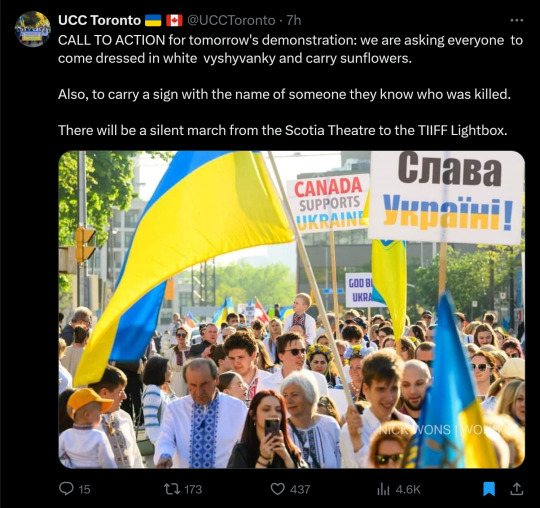
UCC Toronto: On Friday, Sept 13 we will meet in front of Scotiabank Theatre at 1:30pm for a peaceful protest against TIFF's decision to screen "Russians at War". This is the first public screening of the film and the director and some of the team will be present.
But some damage has already been done.

Headline of an article by Marsha Lederman reads: "Russians at War is an exceptional documentary and needs to be seen"
I will make a separate post about this article here. I started reading it and there is a line that made me gasp and almost fall over.
To be continued...
---
Please excuse the transcription of the images. I know they make the post longer, but I'm too aware of images on tumblr not loading. :/ Also, screen readers.
#Ukraine#TIFF#Toronto#Canada#Toronto international film festival#toronto film festival#russians at war#long post#screen reader friendly#article in link
109 notes
·
View notes
Photo




Russian Consulate
11 notes
·
View notes
Text
ASALA: Armenian Secret Army for the Liberation of Armenia (part 1)

In 1915, ottoman turkey committed the Genocide of Armenians: more than 1.5 million Armenians were massacred.
Women were assaulted, raped, sexually mutilated and tortured. Many were killed by bayoneting or died from prolonged sexual abuse. The “lucky ones” managed to kill themselves, while others were sold as slaves, forced to work as prostitutes or into marriage by their perpetrators. An eyewitness testified, "It was a very common thing for them to rape our girls in our presence. Very often they violated eight or ten year old girls, and as a consequence many would be unable to walk, and were shot."
The men were usually separated from the rest of “the deportees” during the first few days and executed, but, of course, not before being tortured and mutilated. Some were crucified, beheaded, others were often drowned by being tied together back-to-back before being thrown in the water. So many bodies floated down the Tigris and Euphrates that they sometimes blocked the rivers and needed to be cleared with explosives. Other rotting corpses became stuck to the riverbanks, and still others traveled as far as the Persian Gulf.
In 1918, the young turk regime took the war into the Caucasus, where approximately 1,800,000 Armenians lived under Russian dominion. Ottoman forces advancing through East Armenia and Azerbaijan here too engaged in systematic massacres. The expulsions and massacres carried by the nationalist turks between 1920 and 1922 added tens of thousands of more victims. By 1923 the entire landmass of Asia Minor and historic West Armenia had been expunged of its Armenian population. The destruction of the Armenian communities in this part of the world was total.
And yet, despite all of this—the unimaginable horrors that plagued the Armenian nation in the early 20th century—what do you think the world did in response? After this descent into hell, after the suffering, the bloodshed, the total annihilation—what followed? Silence. Deafening, shameful silence, as always.
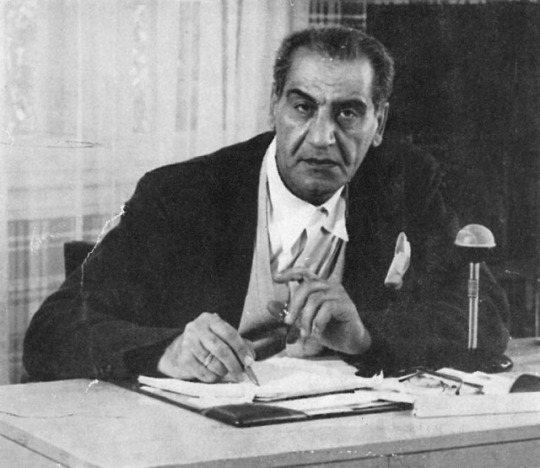
Silence—until it was shattered 58 years later, when, at the age of 78, having exhausted every peaceful avenue to draw the world’s attention to the Armenian Question and faced with nothing but ignorance, Gourgen Yanikyan fired 13 bullets at the Turkish consul and vice-consul. This singular act of defiance wiped 58 years of dust from the forgotten pages of Armenian history, forcing the world to confront the cause once again.By sacrificing his freedom, Yanikyan ignited a movement. His act became the catalyst for a wave of Armenian activism, inspiring the creation of ASALA, who would go on to fight for the recognition of the genocide.

In 1975, a group of Lebanese-Armenians led by Iraqi-Armenian Hakob Hakobyan, all of whose parents and/or grandparents were survivors of the genocide, inspired by Yanikyan’s self-sacrifice, decided to found an underground organization, which through armed actions will again bring the Armenian Question into the international political and legal dimension, present the recognition of the Armenian Genocide carried out by the turks in 1914-1923 by the international community, and create prerequisites for the liberation of Western Armenia. The organization was called ASALA - Armenian Secret Army for the Liberation of Armenia.
The military operations of the ASALA were mainly aimed at turkish embassies, consulates, diplomats, government officials, military and police institutions, the turkish business environment, especially the offices of "turkish airlines corporation", as well as the state and public structures of other countries, which showed financial or military support to the turkish state.
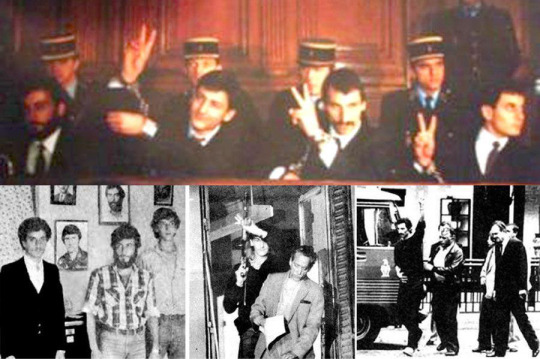
Now, why am I telling you about this today? Well, today - on September 24th marks the 43rd anniversary of the Van Operation (24/09/1981), carried out by 4 Armenian ASALA soldiers - Vazgen Sislyan, Hakob Julfayan, Gevorg Gyuzelyan and Aram Basmajyan. On this day in 1981, four Armenian youths, aged 20-24, armed with pistols, automatic rifles and explosives, seized the turkish consulate in Paris, holding it under their control for 15 hours.
youtube
4 Soldiers of The Van Operation taking off their masks
The trial of “VAN” turned into a trial of the turkish government. The “VAN” operation and the political trial that followed it played a major role in bringing the Armenian issue to the international political arena, globalizing the territorial claim and the violated rights of the Armenian people, creating a new wave of condemnation of the reality of the Armenian genocide, strengthening the pride and spirit of struggle among Armenians.
When all the hope has slipped away, It’s the mad who find a way.
Though violence is condemned, it is the cruel truth that it is the only language to which the world listens.
More about the Van Operation in the second part.
#break the chain of ignorance#armenian genocide#armenia#history#turkish crimes#azeri crimes#turkey#azerbaijan#asala#van operation#gurgen yanikyan#world politics#france#paris#september#baku gp 2024#cop 29#turkish tv series#translated literature#my translations#sorbonne
82 notes
·
View notes
Text
As there is no motive for concealment, I am permitted to use them, and accordingly send you a rescript, simply omitting technical details of seamanship and supercargo. It almost seems as though the captain had been seized with some kind of mania before he had got well into blue water, and that this had developed persistently throughout the voyage. Of course my statement must be taken cum grano, since I am writing from the dictation of a clerk of the Russian consul, who kindly translated for me, time being short.
Interestingly, this is one of the few accounts (if not only) in the book that we know for a fact have been altered. Of course, we shouldn't totally discount the differences between shorthand vs. written English, but this is still another level. The captain's log as we know it has been translated from another language and had details removed. Those details were pretty much just technical jargon that wouldn't interest the average reader, but still.
Mr. Swales' talk of the (lack of) trustworthiness of the written accounts on the tombstones is a good prelude to this. And indeed we see the captain suspected of insanity, some even believing he was the killer, because ay least later parts of his account don't seem realistic. There are some really interesting discussions to be had about the trustworthiness of other people's stories, about the written word specifically, and how that relates to our experience as readers as well as the characters within the world.
#dracula daily#captain of the demeter#I'm not gonna get into it now because a) tons of spoilers b) talkrd it over before in scattered places c) only have limited phone access#and i can't think to write longer meta stuff on the phone. typing is too slow and uses too much thumbwork
49 notes
·
View notes
Text
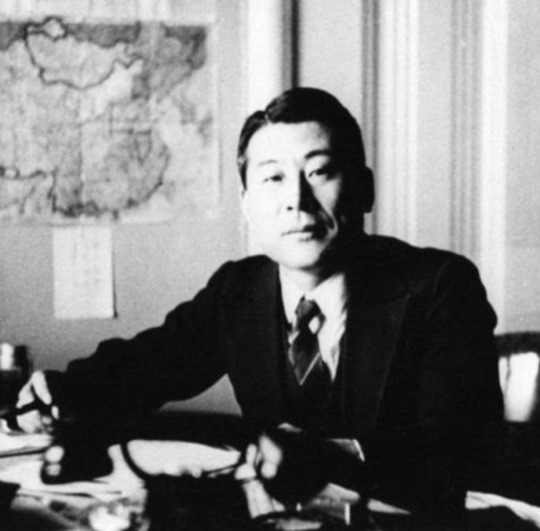
Chiune Sugihara was a Japanese diplomat in Lithuania who put his family and career at risk by issuing thousands of hand-written transit visas to Jewish refugees fleeing Eastern Europe.
Chiune was born to a middle class family in Mino, Japan on the first day of the 20th century – 1/1/00. In elementary and high school he was a top student, and his father wanted him to become a doctor. Chiune’s own dream was to enter the foreign service, and he deliberately failed the medical school entrance exam by writing only his name on the test. Instead Chiune attended Waseda University and majored in English. He also joined a Christian fraternity to practice his English.
In 1919, Chiune passed the Foreign Ministry Scholarship exam, and served in the Japanese Imperial Army as a 2nd Lieutenant stationed in Korea. He resigned his commission in 1922 and trained for the Foreign Ministry, learning Russian and German in addition to English. He aced the qualifying exam and was sent to work in the foreign office in Harbin, China.
Chiune’s strong moral compass led him to resign his post as Deputy Foreign Minister in Manchuria because of rising Japanese violence against the Chinese (just two years later was the horrific Rape of Nanking by the Japanese Imperial Army.) Chiune returned to Japan, where he married Yukiko Kikuchi. They later had four sons.
Next Chiune went to Helsinki, Finland, where he worked as a translator for the Japanese delegation. In 1939, Chiune became vice-consul of the Japanese embassy in Kauna, Lithuania. Part of his job was to find out if Germany planned to attack the Soviet Union, and to relay any information about this to his bosses in Berlin and Tokyo.
In 1940, the Soviet Union occupied Lithuania. At that time, approximately 1/3 of Lithuanians were Jewish, many of them Torah scholars. The USSR viciously persecuted Jews, especially religious ones, and the Jews of Lithuania were desperate to escape the country – especially because Nazi Germany was occupying more and more of Eastern Europe and would soon be in Lithuania. Hundreds of them, mostly Orthodox, visited the Japanese consulate to beg for exit visas to Japan. The official Japanese policy was that candidates for visas must go through elaborate bureaucratic procedures and pay significant sums of money. Chiune contacted his superiors at the Japanese Foreign minister to ask if the rules could be relaxed to help Jewish refugees. His request was denied, as were his next two requests.
Chiune could have thrown up his hands and told the Jews there was nothing he could do for them, but instead, as he did in China, he was governed by his strong sense of right and wrong, rather than soulless bureaucrats. He ignored his orders and started issuing ten-day visas for Jews to travel through Japan on their way to safe havens like Shanghai, China, where 20,000 Jews rode out the war safely.
As word got out about the Japanese visas, Jews from all over Lithuania as well as Poland began to swarm Chiune’s office. He simply wouldn’t say no to anybody, and spent 18-20 hours a day (!) painstakingly writing visas by hand. He created a month’s supply of visas every single day from August to early September 1940, providing an escape route for thousands of Jews. On September 4, the Japanese consulate in Kauna was closed and Chiune had to leave the country. He was determined to create as many transit visas as possible, and continued doing so up until the last minute. At Kanuas Railway Station, a crowd of Jews gathered to say goodbye. Right before boarding the train, Chiune bowed deeply and cried out, “Please forgive me! I cannot write anymore. I wish you the best!” Someone in the crowd shouted, “Sugihara! We’ll never forget you! I’ll surely see you again!”
Chiune was reassigned to East Prussia, then Prague, and then Bucharest, Romania. When the Soviet Union occupied Lithuania in 1944, Chiune and his family were imprisoned in a POW camp for a year and a half. Finally they were released in 1946 and returned to Japan, but the foreign office had heard about his unauthorized visas, and he was forced to resign. At about this time, the Sugihara’s youngest son died of leukemia at age seven.
Unemployable in Japan, Chiune made use of his excellent Russian language skills and spent the next 16 years working in the Soviet Union while his wife and sons stayed in Japan. Chiune’s exceptional heroism was unknown for many years, until 1968, when he was contacted by Yehoshua Nishri, an attache working at the Israeli consulate in Tokyo. Nishri spent his youth in Poland, and heard stories of the legendary Japanese hero. Nishri made it his mission to publicize Chiune’s heroic acts, and the next year, 1969, Chiune traveled to Israel as an honored guest of the Israeli government. Jews he’d saved lobbied for him to be recognized as Righteous Among the Nations by Israeli Holocaust Memorial Yad Vashem, and in 1984 he received the honor. At that time he was too sick to travel, so his wife and son Nobuki accepted the award on his behalf.
Chiune was asked why he risked everything to help thousands of strangers. He answered, “You want to know about my motivation, don’t you? Well. It is the kind of sentiments anyone would have when he actually sees refugees face to face, begging with tears in their eyes. He just cannot help but sympathize with them. Among the refugees were the elderly and women. They were so desperate that they went so far as to kiss my shoes. Yes, I actually witnessed such scenes with my own eyes. Also, I felt at that time, that the Japanese government did not have any uniform opinion in Tokyo. Some Japanese military leaders were just scared because of the pressure from the Nazis; while other officials in the Home Ministry were simply ambivalent. People in Tokyo were not united. I felt it silly to deal with them. So, I made up my mind not to wait for their reply. I knew that somebody would surely complain about me in the future. But, I myself thought this would be the right thing to do. There is nothing wrong in saving many people’s lives… The spirit of humanity, philanthropy… neighborly friendship… with this spirit, I ventured to do what I did, confronting this most difficult situation – and because of this reason, I went ahead with redoubled courage.”
Chiune Sugihara died in Japan on July 31, 1986. Despite being a hero in Israel, and among Jews worldwide, he was completely unknown in his own country. Even his own children didn’t know what he had done. A huge delegation from around the world attended Chiune’s funeral, and only then did he become known in Japan.
Chiune received many awards and accolades, most of them posthumous. Among them are Sugihara Streets in Vilna, Lithuania, and Jaffa and Netanya in Israel. There is a Sugihara House Museum in Kaunas, and a park in Vilna where 200 trees were planted on his 100th birthday. There is a life-sized statue of him in Little Tokyo in Los Angeles, featuring a plaque with a quotation from the Talmud, “He who saves one life, saves an entire world.” In 1998, Chiune’s widow Yukiko traveled to Israel and was warmly received by survivors who’d been saved by her husband. There is a Sugihara park in Jerusalem, and he was featured on an Israeli postage stamp in 1998. The Lithuanian government declared 2020 “The Year of Chiune Sugihara.” He has been the subject of multiple works of art, including books, films and a play.
It’s estimated that over 100,000 people are alive today because of the brave actions of Chiune Sugihara.
112 notes
·
View notes
Text


the commission had Leon Trotsky - who was a important figure in the Russian revolutions, was second in command to Valdimir Lenin, and who opposed Stalin's politics - assassinated.

the file this is found in is addressed as one of Five's cases ↑
transcript:
MEMORANDUM ON INTENDED EVENTS RE: THE DEATH OF LEON TROTSKY August 21, 1940 Background: On 24 May 1940, Trotsky survived a raid on his villa by armed assassins led by the NKVD agent Iosif Grigulevich and Mexican painter David Alfaro Siqueiros. Trotsky's 14-year-old grandson, Vsevolod Platonovich "Esteban" Volkov (born 7 March 1926), was shot in the foot, and a young assistant and bodyguard of Trotsky, Robert Sheldon Harte, was abducted and later murdered. Trotsky's other guards fended off the attackers. Event to Occur: With the previous attack thwarted, the following is to take place, ensuring continuity. Trotsky has already created cover by claiming that Josef Stalin would seek additional assassination attempts. On 20 August 1940, Trotsky will be attacked in his study with an ice axe by one Mr. Mercader, whom he has not previously met. Our agent will assume the guise of Mr. Mercader. The blow to his head is to be bungled and fail to kill Trotsky instantly, but nonetheless prove fatal. A struggle will ensue and though the agent is to be captured, his extraction will occur at a future moment of Commission discretion, at which time a bosy double will be placed as perpetrator and will stand trial for the assault. His sacrifice for the Commission will be noted in the logs. Witnesses are to see the following and make their claims to the new media and local law enforcement: that Trotsky spat on Mercader and began struggling fiercelt with the assasilant, which results in Mercader's hand being broken. Hearing the commotion, Trotsky's bodyguards burst into the room and nearly killed you, but Trotsky will stop them, stating that the assassin should be made to answer questions. Trotsky will then be taken to a hospital, operated on, and survive for more than a day, dying at the age of 60 on 21 August 1940 from exsanguination and shocck. The agent will testify at trial and remain imprisoned until the moment of extraction and replacement by the secrificial unit. A history of Trotsky's exile: In February 1929, Trotsky was deported from the Soviet Union to his new exile in Turkey. During his first teo months in Turkey, Trotsky lived with his wife and eldest son at the Soviet Union Consulate in Constantinople and then at a nearby hotel in the city. In April 1929, Trotsky, his wife and son were moved to the island of Buyukada (aka Prinkipo) by the Turkish authorities. On Prinkipo, they were moved into a house called the Yanaros mansion, where Trotsky and his wife lived until July 1933. During his exile in Turkey, Trotsky was under the surveillance of the Turkish police forces of Mustafa Kemal Pasha. Trotsky was also at risk from the many former White Army officers who lived on Prinkipo, officers who had opposed the October Revolution and who had been defeated by Trotsky and the Red Army in the Russian Civil War. However, Totsky's European supporters volunteered to serve as bodyguards and assured his safety. Trotsky's house, the Yanaros mansion on the island of Buyukada in Turkey, as it

TROTSKY ASSASSINATION ATTEMPT INTELLIGENCE SUMMARY Place | Date | Hour | Summary of Events and Information | Remarks MOSCOW, April | 2. | A deviation occured in the first agent's plot assassinate Leon Trotsky in May of 1940. | EF 5. | Progress in planning of the second plot, for August 20, 194, has progressed unhindered. | SB MEXICO CITY May | 7. | Leon Trotsky will be in his study on August 20, 1940, as expected, and will be welcoming his guest, one Mr. Mercader, whom he has never met previously. | - 9. | The tool to be used for this attack, an ice axe, will be placed in discrete location No. 224-MC-B12, Annex 16, per Commission protocol. | EF 20. | The Mission objective will be carried out, after which time the parameters of expected history will be reset to their correct trajectories. | TD Instructions regarding Intelligence Summaries are contained in Regula II and the Management Manual. Title pages will be prepared in manuscript.

To CASE MANAGER 0038 From FIELD AGENT 00293 Subject Trotsky assassination attempt Pneumatic Transit Code [multiple strongs of number as seen in the image above] My recommendation is to reconsider our current outlook concerning the viability of the subject's tool of action, the ice axe, in light of recent events. The project has stalled at numerous points over the past months and contines to progress at a menial pace. Should the current iteration of the device be completed as is it will fail to provide enough force to puncture the fuel tank given the density of the aluminum alloy used in the manufacturing of the encasement. I expect that the subject will proceed as required.
29 notes
·
View notes
Video
youtube
❗🗺 Should there be such a car in front of every russian consulate/embassy?🤣
➡️ IF YES - 👍 ➡️ Completely agree - subscribe 💛💙 https://bit.ly/molfarua
❗🗺 Чи має бути такий автомобіль перед кожним російським консульством/посольством?🤣
➡️ ЯКЩО ТАК — 👍 ➡️ Повністю згодні — підписка 💛💙 https://bit.ly/molfarua
#youtube#❗🗺 Should there be such a car in front of every russian consulate/embassy?🤣 ➡️ IF YES - 👍 ➡️ Completely agree - subscribe 💛💙 https://b
0 notes